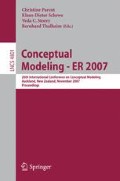Abstract
Modeling is an important and time consuming part of the Business Process Management life-cycle. An analyst reviews existing documentation and queries relevant domain experts to construct both mental and concrete models of the domain. To aid this exercise, we propose the Rapid Business Process Discovery (R-BPD) framework and prototype tool that can query heterogeneous information resources (e.g. corporate documentation, web-content, code e.t.c.) and rapidly construct proto-models to be incrementally adjusted to correctness by an analyst. This constitutes a departure from building and constructing models toward just editing them. We believe this rapid mixed-initiative modeling will increase analyst productivity by significant orders of magnitude over traditional approaches. Furthermore, the possibility of using the approach in distributed and real-time settings seems appealing and may help in significantly improving the quality of the models being developed w.r.t. being consistent, complete, and concise.
Access this chapter
Tax calculation will be finalised at checkout
Purchases are for personal use only
Preview
Unable to display preview. Download preview PDF.
References
Smith, H., Fingar, P.: Business Process Management: The Third Wave. Meghan-Kiffer Press, Tampa, FL (2003)
van der Aalst, W.M., ter Hofstede, A.H., Weske, M.: Business process management: A survey. In: van der Aalst, W.M.P., ter Hofstede, A.H.M., Weske, M. (eds.) BPM 2003. LNCS, vol. 2678, pp. 1–12. Springer, Heidelberg (2003)
Sommerville, I., Sawyer, P., Viller, S.: Manging process inconsistency using viewpoints. IEEE Transactions on Software Engineering 25, 784–799 (1999)
Gruber, T.R.: Automated knowledge acquisition for strategic knowledge. Machine Learning 4, 293–336 (1989)
RBPD: Rapid model discovery project, http://www.dsl.uow.edu.au/projects/rmd/
Boose, J.H.: Knowledge aquisition, methods, and mediating representations. In: First Japanese Knowledge Aquisition for Knowledge-Based Systems Workshop (JKAW’90) (1990)
Hoffman, R.R., Shadbolt, N.R., Burton, M., Klein, G.: Eliciting knowledge from experts: A methodological analysis. Organizational Behaviour and Human Decision Processes 62, 129–158 (1995)
Young, R.M., Gammack, J.: The role of psychological techniques and intermediate representations in knowledge elicitation. In: Proceedings of the First European Workshop on Knowledge Acquisition and Knowledge-based Systems (1987)
Shore, B.: Bias in the development and use of an expert system: Implications for lifecycle costs. Industrial Management and Data Systems 4, 18–26 (1996)
Hoffman, R.R.: Bibliography: Automated knowledge elicitation, representation, and instantiation. In: Bibliography: Automated knowledge elicitation, representation, and instantiation, pp. 346–358. Erlbaum, Hillsdale, NJ (1992)
Reubenstein, H.B., Waters, R.C.: The requirements apprentice: Automated assistance for requirements acquisition. IEEE Trans. Softw. Eng. 17(3), 226–240 (1991)
de Medeiros, A., van der Aalst, W., Weijters, A.: Workflow mining: Current status and future directions. In: Meersman, R., Tari, Z., Schmidt, D.C. (eds.) OTM 2003. LNCS, vol. 2888, Springer, Heidelberg (2003)
van der Aalst, W.M.P., Song, M.: Mining social networks: Uncovering interaction patterns in business processes. In: Desel, J., Pernici, B., Weske, M. (eds.) BPM 2004. LNCS, vol. 3080, pp. 244–260. Springer, Heidelberg (2004)
Rozinat, A.W.M.P.v.d.A.: Decision mining in prom. In: Business Process Management. (2006) 420–425
Ellis, C.A., Rembert, A.J., Kim, K.-H., Wainer, J.: Beyond worflow mining. In: Dustdar, S., Fiadeiro, J.L., Sheth, A. (eds.) BPM 2006. LNCS, vol. 4102, Springer, Heidelberg (2006)
Sommerville, I., Sawyer, P.: Viewpoints: Principles, problems and a practical approach to requirements engineering. Annals of Software Engineering 3, 101–130 (1997)
Easterbrook, S., Nuseibeh, B.: Using viewpoints for inconsistency management. BCS/IEE Software Engineering Journal, 31–43 (January 1996)
Easterbrook, S., Finkelstein, A., Kramer, J., Nuseibeh, B.: Co-ordinating distributed viewpoints: the anatomy of a consistency check. Technical Report 94/7, Department of Computing, Imperial College, London (1994)
Czarnecki, K., Helsen, S.: Classification of model transformation approaches. In: Proc. OOPSLA’03 Workshop on Generative Techniques in the Context of Model-Driven Architecture (2003)
Koliadis, G., Vranesevic, A., Bhuiyan, M., Krishna, A., Ghose, A.: A combined approach for supporting the business process model lifecycle. In: Proc. of the 10th Pacific Asia Conference on Information Systems (PACIS’06) (2006)
Holocentric (2007), http://www.holocentric.com
Xu, K., Lianchen, L., Wu, C.: A three-layered method for business process discovery and its application in manufacturing industry. Computers in Industry 58, 265–278 (2007)
BEA: Introduction to business process management and the sample workflows. Accessed: 27.02.07 (2007), http://edocs.bea.com/wli/docs70/bpmtutor/ch1.htm
Klein, E.: Computational semantics in the natural language toolkit. In: Proceedings of the 2006 Australasian Language Technology Workshop (ALTW2006), pp. 26–33 (2006)
Pham, S., Hoffmann, A.: Efficient knowledge acquisition for extracting temporal relations. In: Proceedings of the Australasian language technology workshop, pp. 87–95 (2005)
Yu, E.: Models for supporting the redesign of organizational work. In: Proceedings of Conf. on Organizational Computing Systems (COOCS’95), Milpitas, CA: USA, August 13-16 1995, pp. 225–236 (1995)
White, S.: Business process modeling notation (bpmn), Technical report, OMG Final Adopted Specification 1.0 (2006), http://www.bpmn.org
Lu, R., Sadiq, S.: Managing process variants as an information resource. In: Dustdar, S., Fiadeiro, J.L., Sheth, A. (eds.) BPM 2006. LNCS, vol. 4102, Springer, Heidelberg (2006)
Author information
Authors and Affiliations
Editor information
Rights and permissions
Copyright information
© 2007 Springer-Verlag Berlin Heidelberg
About this paper
Cite this paper
Ghose, A., Koliadis, G., Chueng, A. (2007). Rapid Business Process Discovery (R-BPD). In: Parent, C., Schewe, KD., Storey, V.C., Thalheim, B. (eds) Conceptual Modeling - ER 2007. ER 2007. Lecture Notes in Computer Science, vol 4801. Springer, Berlin, Heidelberg. https://doi.org/10.1007/978-3-540-75563-0_27
Download citation
DOI: https://doi.org/10.1007/978-3-540-75563-0_27
Publisher Name: Springer, Berlin, Heidelberg
Print ISBN: 978-3-540-75562-3
Online ISBN: 978-3-540-75563-0
eBook Packages: Computer ScienceComputer Science (R0)

